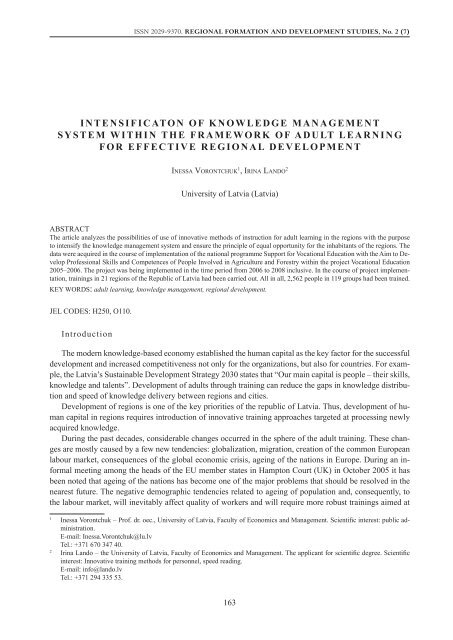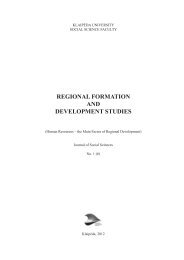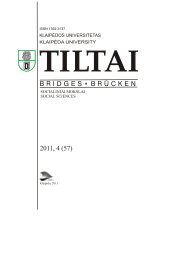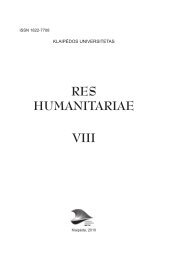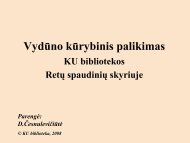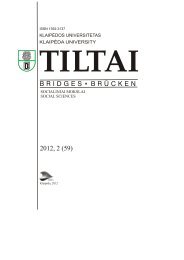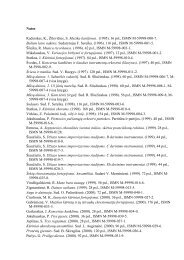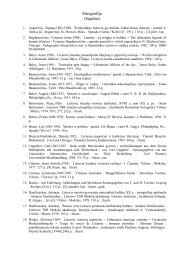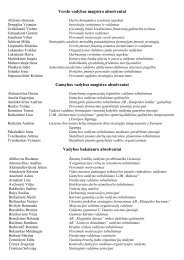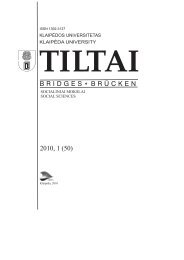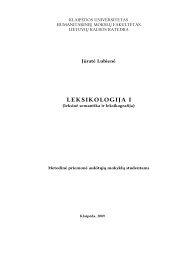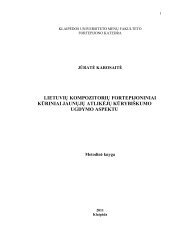regional formation and development studies - KlaipÄdos universitetas
regional formation and development studies - KlaipÄdos universitetas
regional formation and development studies - KlaipÄdos universitetas
Create successful ePaper yourself
Turn your PDF publications into a flip-book with our unique Google optimized e-Paper software.
ISSN 2029-9370. Regional Formation <strong>and</strong> Development Studies, No. 2 (7)<br />
INTENSIFICATON OF KNOWLEDGE MANAGEMENT<br />
SYSTEM WITHIN THE FRAMEWORK OF ADULT LEARNING<br />
FOR EFFECTIVE REGIONAL DEVELOPMENT<br />
Inessa Vorontchuk 1 , Irina L<strong>and</strong>o 2<br />
University of Latvia (Latvia)<br />
ABSTRACT<br />
The article analyzes the possibilities of use of innovative methods of instruction for adult learning in the regions with the purpose<br />
to intensify the knowledge management system <strong>and</strong> ensure the principle of equal opportunity for the inhabitants of the regions. The<br />
data were acquired in the course of implementation of the national programme Support for Vocational Education with the Aim to Develop<br />
Professional Skills <strong>and</strong> Competences of People Involved in Agriculture <strong>and</strong> Forestry within the project Vocational Education<br />
2005–2006. The project was being implemented in the time period from 2006 to 2008 inclusive. In the course of project implementation,<br />
trainings in 21 regions of the Republic of Latvia had been carried out. All in all, 2,562 people in 119 groups had been trained.<br />
KEY WORDS: adult learning, knowledge management, <strong>regional</strong> <strong>development</strong>.<br />
JEL codes: H250, O110.<br />
Introduction<br />
The modern knowledge-based economy established the human capital as the key factor for the successful<br />
<strong>development</strong> <strong>and</strong> increased competitiveness not only for the organizations, but also for countries. For example,<br />
the Latvia’s Sustainable Development Strategy 2030 states that “Our main capital is people – their skills,<br />
knowledge <strong>and</strong> talents”. Development of adults through training can reduce the gaps in knowledge distribution<br />
<strong>and</strong> speed of knowledge delivery between regions <strong>and</strong> cities.<br />
Development of regions is one of the key priorities of the republic of Latvia. Thus, <strong>development</strong> of human<br />
capital in regions requires introduction of innovative training approaches targeted at processing newly<br />
acquired knowledge.<br />
During the past decades, considerable changes occurred in the sphere of the adult training. These changes<br />
are mostly caused by a few new tendencies: globalization, migration, creation of the common European<br />
labour market, consequences of the global economic crisis, ageing of the nations in Europe. During an informal<br />
meeting among the heads of the EU member states in Hampton Court (UK) in October 2005 it has<br />
been noted that ageing of the nations has become one of the major problems that should be resolved in the<br />
nearest future. The negative demographic tendencies related to ageing of population <strong>and</strong>, consequently, to<br />
the labour market, will inevitably affect quality of workers <strong>and</strong> will require more robust trainings aimed at<br />
1<br />
Inessa Vorontchuk – Prof. dr. oec., University of Latvia, Faculty of Economics <strong>and</strong> Management. Scientific interest: public administration.<br />
E-mail: Inessa.Vorontchuk@lu.lv<br />
Tel.: +371 670 347 40.<br />
2<br />
Irina L<strong>and</strong>o – the University of Latvia, Faculty of Economics <strong>and</strong> Management. The applicant for scientific degree. Scientific<br />
interest: Innovative training methods for personnel, speed reading.<br />
E-mail: info@l<strong>and</strong>o.lv<br />
Tel.: +371 294 335 53.<br />
163


